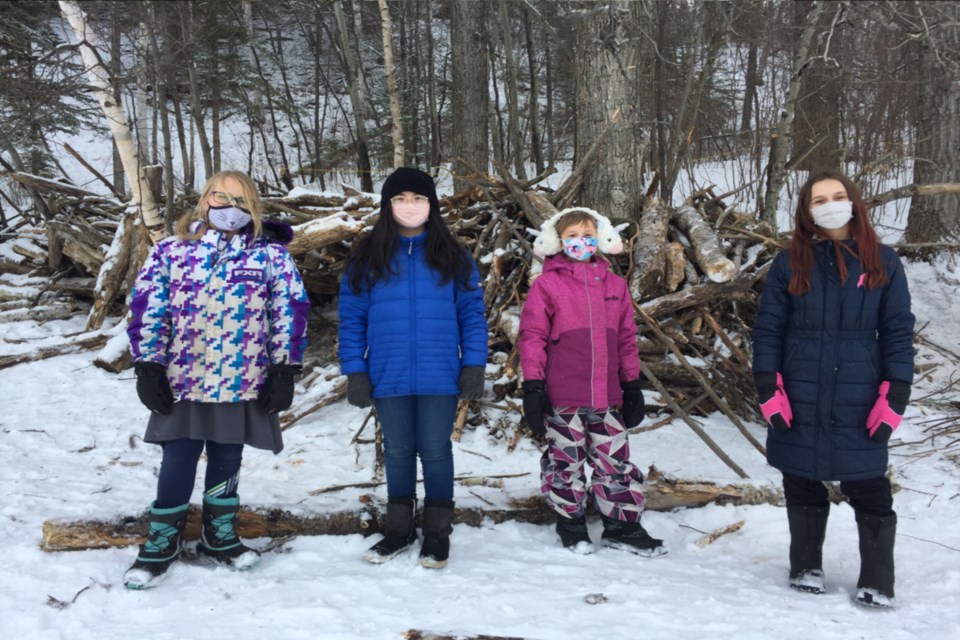ATHABASCA — It is much tamer than Lord of the Flies, but the microcosm of society that develops in the Landing Trail Intermediate School (LTIS) Woodland Kids program is no less fascinating.
Since starting in 2016 it is a unique recess activity taking place on the east side of LTIS in a designated area where groups of students in Grades 4-6, scrounge for dead fall to build a variety of forts, lean-tos and teepees, explained principal Joe MacIssac, along with the four students who make up the Woodland Kids Council, where they negotiate resolutions between arguing forts.
“I love Woodland Kids as is, and when I was in Grade 4, I didn’t get to be a councillor, but people who did, it seemed like it was really fun to be a councillor,” said Woodland Kids council chair Farrah Kamelchuk, who is in Grade 6.
It is not just about being a councillor though, it’s about being with your friends and having some fun, said council member Mia Jodry, Grade 4.
“My friends really wanted to try it and so, I thought, ‘Hey, I’ll try it, it seems fun,’” she said.
For Makila Lowe, who is in Grade 5, it is an opportunity to learn about building things.
“(I’ve learned) how to make the structure stronger and kind of make it so that there's no snow in it and there's a lot of stuff that needs to be put into it to actually make it stable,” said Lowe.
Grade 5 student Isabella Arellano said she admires the imagination students use to create their forts
“I really like how kids put their imagination in their own structures and I have a lot of ideas for building forts,” she said. “So, I saw my friends doing it and they said, 'Oh you should come join' and I said 'Yeah, sure.'"
Arellano added the students are not allowed to use living branches or trees and have to search for dead fall, although anyone who wants to drop off dead fall can, where it sits for three days before being divvied up.
“We're not allowed to break off alive branches, and then some days we would go up into the more forested area and get more of the dead fall,” she said.
Anywhere from 25 to 50 students take part in the program — numbers ebb and flow as students are not obligated to build a fort.
MacIssac noted the students are not just building shelters, but micro-societies, posting sentries to keep a fort safe while others collect supplies or build trading posts and so on.
“This just happens very organically” said MacIssac. “A couple years ago, I noticed that kids kind of divided themselves up into their groups according to their forts and they had elected their leaders and sub leaders; in some forts that were hierarchies that were built. So, all kinds of very interesting social aspects just developed.”
With those different forts conflict can bubble up and that is when the council gets involved.
“The council's job was anytime a conflict arises — normally the students would come and talk to the adult supervisor who's there — and that type of conflict can be resolved by the students,” said MacIssac. “They aren’t always able to do it, and if they can't resolve it themselves, then they will go to the Woodland Kids Council. This year, so far, all conflicts have been resolved by the council.”
A recent dispute involved a smaller fort being added to by another group.
“What we did was ask for both sides of what happened,” Lowe said. “And then try to find a solution for them to compromise.”
Ultimately the council decided the fort would be shared, but no more heavy wood would be placed on top.
It is always a learning opportunity and Lowe said she has realized sometimes kids do not want to listen to each other.
Jodry said it was important to listen to both sides.
“I learned that you always have to listen to both sides even if you're on one of those sides; like if you're in a fight, you need to listen to both of those sides to come to a compromise,” she said.
And while the students learn how to compromise both within individual forts and by resolving disputes with the council, they are learning valuable life skills.
“My fort only has five people and we decided to make a truce with a different fort and build their fort that connected to our fort,” Lowe said.
At the end of the year, each fort is then broken down and scattered, ready to be gathered up again the next school year to start all over.
“It’s very complex and really good social skill development,” MacIssac said. “Also, conflict resolution; these kids are talking about compromise and how they are put in situations where they’re finding a way to work through a problem and they have to be good at it and they have been good with it.”



